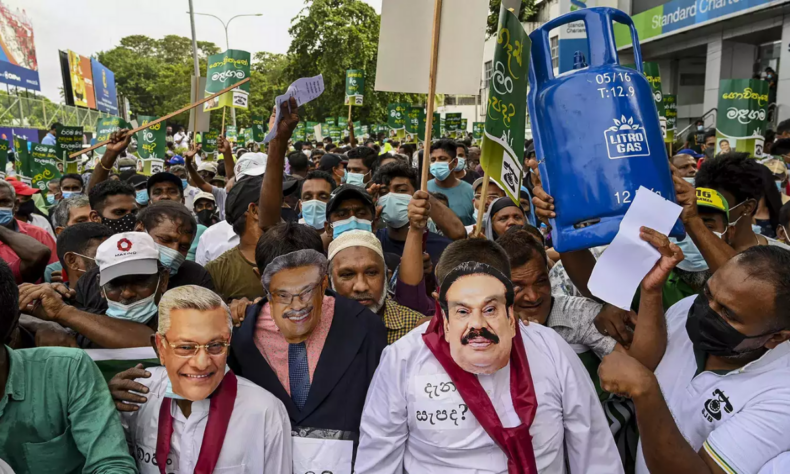Sri Lanka is having a tough time facing the worst economic crisis as the country’s economy drops to lower measures. It hasn’t faced a crisis like this in the last 70 years.
Sri Lanka is suffering one of the worst economic downfalls in several years. The last time Sri Lanka faced such inflation was when it became independent in 1948. The prices of all essential commodities are soaring. People are fleeing the country to take refuge in India.
In the past few weeks, the prices of commodities like milk, food grains, rice, and vegetables have gone through the roof. Furthermore, the schools are not conducting examinations as the price of paper is too high. Schools and institutions are unable to print paper due to a shortage of it.
The government is feeling helpless to bring the economy back on track. However, Sri Lanka is finding its last hope in India and China for aid.
On the other hand, to control the violence that followed the turmoil, the Sri Lankan government ordered troops to check on the distribution of essential commodities and fuel. Reports suggest that many people lost their lives during the violence that erupted while waiting in the queue for petrol and diesel.
Root cause of the Economic Crisis in Sri Lanka
The major reason for the significantly deteriorating economy of Sri Lanka is the shortage of foreign currency. Because of this, the country can’t get essential goods from the global market.
Evidently, Sri Lanka relies heavily on imports. Petrol, diesel, food, sugar, lentils, paper, medicine, etc. are all imported from different countries. Currently, the country doesn’t have enough money in its foreign exchange account to buy things that its citizens need.
Due to the shortage of paper and rising prices, the island nation is not able to conduct examinations. Furthermore, there is a shortage of crude oil supplies. Thus, the government has temporarily suspended operations at the oil refineries.
During the COVID-19 pandemic, the tourism sector was entirely halted. A major portion of Sri Lanka’s foreign exchange came from the tourism sector. Last week, Prime Minister Mahinda Rajapaksa stated that the country is suffering from a trade deficit of around $10 billion.
The country relied majorly on tourism, and it imported more than it could export. The Colombo bomb blast in 2019 and the COVID-19 pandemic are the 2 major events that hit Sri Lanka’s foreign exchange.
Sri Lanka’s foreign exchange reserves have been depleted, falling from $1.6 billion in 2018 to $548 million in 2020.Countries like China and many other European nations have reduced their foreign exchange earnings as they face some issues with trade.
Sri Lankan government seeks help
When the economic crisis hit Sri Lanka, inflation was at 15.1% last month. The present data released by the Sri Lankan authorities, states that inflation has increased to 25.7% now.
People are protesting all over the country due to the rising prices. The price of cooking gas cylinders is on a significant rise of ₹1359 on each cylinder every week. The government is forced to deploy the army to check on the peaceful distribution of commodities.
Concerned about the situation in Sri Lanka, Indian Foreign Affairs Minister Dr. Subrahmanyam Jaishankar said that India stands with Sri Lanka. In his tweet, he mentioned, “Neighbourhood first. India stands with Sri Lanka. A US$1 billion credit line was signed for the supply of essential commodities. Key element of the package of support extended by India. “
However, Sri Lanka has refused IMF assistance (IMF).Sri Lanka has always relied on nations like India, China, and Japan for assistance. The country also seeks assistance from the World Bank and the Asian Development Bank.
The reason why the island nation doesn’t seek help from the IMF is the conditions imposed by the IMF. If Sri Lanka agrees to restructure its debt, it would have to adhere to the IMF’s directives. The directives include an increase in income tax and having an independent central bank.
However, President Gotabya Rajapaksa has agreed to work closely with the IMF and have discussions about its directives. He said, “We must take action to increase our foreign exchange reserves. To this end, we have initiated discussions with international financial institutions as well as with our friendly countries regarding repayment of our loan instalments.
Whereas the IMF stated, “The outlook (of Sri Lanka) is subject to large uncertainties with risks tilted to the downside. Unless the fiscal and balance-of-payments financing needs are met, the country could experience significant contractions in imports and private credit growth, or monetary instability in the case of further central bank financing of fiscal deficits.”
Published By : Revathy G Sanal
Edited By : Subbuthai Padma













